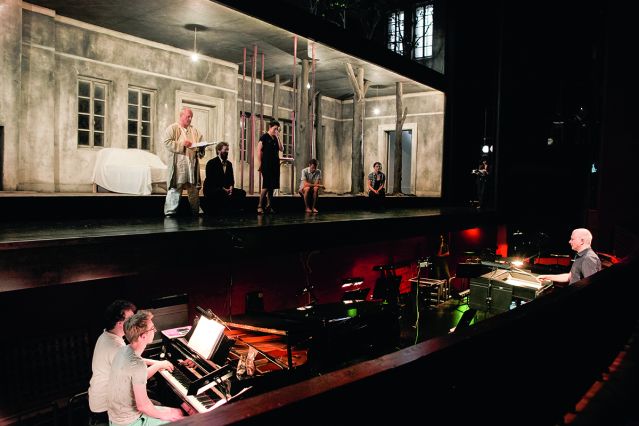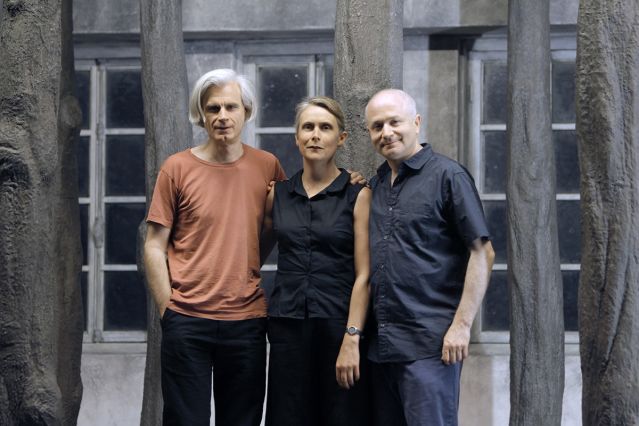A momentous affair - Deutsche Oper Berlin
A momentous affair
It was her second collaboration, and only the second opera of the composer. WRITTEN ON SKIN became an off-the-cuff global success. This celebrated production is now coming to Berlin
The achievement of major works of art often lies in the fact that they manage to escape from foreseeable forms and surprise the public, even if they’re operating in the contemporary field. WRITTEN ON SKIN is one of these deft works that need just a little time and exceed expectations. This opera features contemporary music that even manages to appeal to those music fans who would otherwise feel like strangers in this genre; it tells a story that is as complex as it is straightforward; the public is transported to a distant time that nevertheless feels contemporary in many ways.
After its 2012 debut performance in Aix-en-Provence, this work by composer George Benjamin (libretto: Martin Crimp) went on to travel halfway across the world. The version that is now finally coming to Berlin features the original staging by Katie Mitchell. Why was WRITTEN ON SKIN so extraordinarily successful?

The plot ostensibly involves a love triangle set in the 13th century. The Protector, a rich patriarch, commissions a young illustrator to paint him a book that would bequeath his greatness to posterity. Agnès, the Protector’s young wife who he considers to be »property«, discovers in the pictures her own desire – A desire for visibility. She uses the painter to lay claim to her place in the world and gives her body. He paints her. The exchange is discovered, the Boy must die, and the patriarch serves his wife the roasted heart of the lover.
A technical trick intensifies the drama of the events. The characters play first-person and then distant third-person roles while they are talking and singing, as if they were addressing themselves to the public. This makes the situation look like it’s particularly inevitable. Although they can step out of the story, they can’t get away from their fate. It’s as if they’re watching a fatal accident - their own fatal accident - in slow-motion.
On the one hand, the three angels that emerge perform a choral function, i.e. they comment on events. On the other hand, they are also pilots who transport us from the present era into the 13th century; the printing press had not yet been invented, and most people could neither read nor write. This is why pictures were so powerful. However, the historical distance shrinks when think of the story as an allegory of art itself. After all, isn’t the seemingly archaic power of images and voices - which dictate the plot of this work - also inherent in the genre of opera in general?
In a subtle way, WRITTEN ON SKIN also represents an evening that’s dedicated to the performing arts. In the context of this work, the English word ‘skin’ refers to the parchment of a book in the 13th century. However, the word ‘skin’ also refers to human skin: Theatre performers bring written works to life, as if they had been written on their own bodies. We watch as the power of imagination leaves paper behind and uses physical bodies to tell a story that is as passionate as it is destructive.
Those who can paint pictures or have them commissioned gain influence. That’s how it was in the middle ages, but it still holds true today. Art is where this magical power is both created and reflected. This is the ideal version of a modern work of art that can combine sensuality and complexity. Perhaps that explains why WRITTEN ON SKIN has become so popular after its debut performance in 2012. Compared to the canon of the Italian opera, the story is outlined quite rapidly, but the manner in which it is told accommodates the media habits of the 20th and 21st centuries.
The manner in which opera’s characters are confused by the paintings is similar to the manner in which we end up being confused by the endless stream of images that comes our way when keep scrolling our way through our mobile phones as a result of our inability to put the devices down. WRITTEN ON SKIN shows the nervousness that was prevalent 800 years before the era of digitalisation, but it depicts the process in conjunction with a tense calm that can topple over at any time. This tension primarily comes from the music.

Benjamin’s compositions are very close to the voices. For example, instead of being characterised by their own leitmotifs, the characters are characterised by acoustic colours that correspond to their psychological condition. The relationship is so indivisible and organic that it sometimes feels like the music is flowing directly out of the singers’ mouths. And even though the compositions are far removed from the laws of a Verdi opera, Benjamin’s work enables us to hear clear tonal centres that some contemporary operas would avoid.
Conventions aren’t necessarily bad things. They help a society agree on values, whether affirmative or negative. From the middle to late 19th century, the main parties usually sang in a specific way: The woman usually sang in a soprano voice, and her lover sang in a tenor voice. These days, we talk differently about the relationship between the genders. That’s why the countertenors of the baroque style seem to be closer to us. They can be heard in many of the opera houses’ contemporary productions. This is the case with the role of the Boy, whose singing is also related to one of the three angels who take us through the timeline. His character’s gender-fluid voice lets the violence and Archaic period associated with both the patriarch and his wife appear that much more clearly. When it comes to the countertenor, the issue of whether a feminine or masculine voice is doing the singing is beside the point. It can depict many things, such as the erotic seduction and the creativity of the painter, who puts himself in danger by initiating the other side’s fantasies. Aryeh Nussbaum Cohen will be singing the countertenor in Berlin.
In January 2023, the Ernst von Siemens Stiftung announced that it was going to be honouring Sir George Benjamin with the international Ernst-von-Siemens-Musikpreis, which is effectively the Nobel Prize of the music world. WRITTEN ON SKIN is probably the work that paved the way for him to receive this highest of honours.
Tobi Müller is an independent culture journalist and author. He writes and talks about the performing arts, pop and digital issues.





